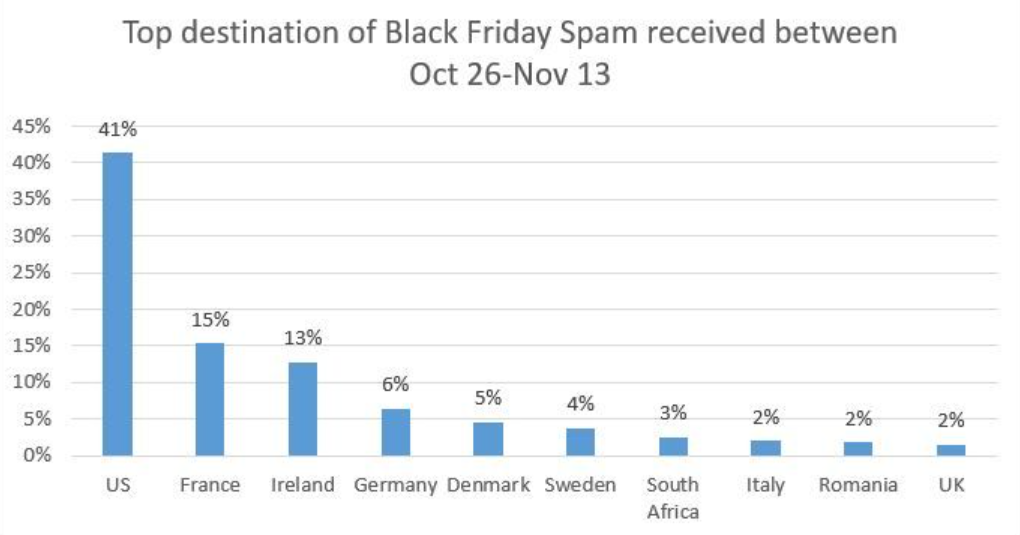
The 2023 Black Friday deals are rolling out, but beware of scams. (Generated with AI)
The 2023 Black Friday deals are rolling out, but beware of the scams
- Black Friday deals in 2023 bring not only shopping excitement but also increased risks of cyber-scams.
- Cybercriminals are readying scams, making vigilance essential for safe shopping.
- Bitdefender’s report reveals the rise in targeted email scams during this shopping season.
As the calendar inches closer to Black Friday, a palpable buzz fills the air. Shoppers everywhere are gearing up, armed with wish lists and strategically planned routes to snag the best deals of the year. From doorbuster sales to once-in-a-lifetime discounts, it’s the day when retail dreams come true and savvy shoppers score big. But as excitement mounts, so does the opportunity for cybercrooks who lie in wait.
This shopper’s paradise transforms into a prime hunting ground for digital predators, eager to exploit the frenzy. They see this day of significant discounts not just as a chance for consumers to save money, but as an opportunity to tap into the billions spent – through a range of scams. With shoppers focused on the thrill of hunting down bargains, the need for increased awareness and vigilance becomes paramount.
Black Friday deals 2023: the online threat landscape
The range of online threats shoppers face on Black Friday is extensive. Scammers employ emails, texts, and social media to reach their targets. While some scams are easily identifiable, others involve more intricate deceptions, specifically targeting enthusiastic online shoppers.
Millions fall prey to scams yearly, but pre-Christmas sales, like Black Friday, are peak times for cybercriminals. Recently, Bitdefender Antispam Lab has diligently tracked Black Friday spam trends, aiming to inform the public about prevalent email scams to protect their finances and personal data.

Beware of retailers scamming you too. (Source – X)
Black Friday spam emails vary widely, from harmless unsolicited messages intended to draw shoppers to stores, to more insidious content. The focus here is not on the aggressive marketing emails that flood inboxes during peak sales, but on the email-based scams exploiting Black Friday’s hype.
In this report from Bitdefender Antispam Lab, antispam researcher Viorel Zavoiu presents intriguing statistics on this year’s Black Friday scam topics and trends. Notably, the spam rate for Black Friday, almost non-existent post-Halloween, has been climbing, peaking at 22% on November 13. This trend of spam emails, encompassing both marketing and scams, is expected to rise throughout Black Friday week.
Bitdefender Antispam filters indicate that only 56% of all Black Friday-themed spam between October 26 and November 13 was legitimate marketing. The rest, 46%, were identified as scams. These included fraudulent campaigns impersonating significant retailers like Amazon and Target and tempting offers on luxury items and gadgets. 39% of such spam originated from the Netherlands, with the US contributing just 24%, a notable decrease from the previous year.
Bitdefender’s telemetry also points to finance and retail as the most targeted sectors in recent phishing campaigns. Black Friday shopping scams are intertwined with traditional phishing efforts, with campaigns aiming to hijack accounts from platforms like Amazon, eBay, and PayPal, and target shoppers’ bank details.
For instance, on November 6, 42% of all PayPal-related emails were marked as scams, and on November 13, 25% of Amazon-themed emails were fraudulent.
Identifying and avoiding scams among 2023 Black Friday deals
Using their extensive experience, scammers consistently target eager yet uninformed consumers with a barrage of ‘incredible deals,’ aiming to steal identities and perpetrate fraud.
This year’s scam strategies closely mirror 2022, with cybercriminals recycling proven tactics. Recently, many Black Friday-related scams have been designed to entice users with early access to exclusive deals, promotions, and complimentary gift cards or prizes from renowned retailers.

Top destination of Black Friday spam received between October 26th to November 13th. (Source – Bitdefender)
Many of these email scams have displayed evident use of geo-targeting, allowing fraudsters to customize their attacks for specific locations. Others imposed geographical restrictions, such as emails masquerading as Aldi’s, where access to fraudulent sites was limited to the target audience’s location—for instance, scams targeting Australian consumers were accessible solely through Australian IP addresses.
These deceptive emails often include ‘poison text’ or extensive, typically hidden text segments intended to bypass keyword-based spam filters.
The array of Black Friday scams in 2023 is extensive, featuring numerous giveaway frauds falsely attributed to well-known brands in the consumer goods sector. These emails aim to extract personal and payment information from recipients via sham surveys and counterfeit prizes, including golf carts, smart gadgets, and gift cards, often luring victims with minor shipping charges. Some of the most popular email subjects include:
- “Claim your chance to win a US$100 Amazon voucher”
- “Get into the spirit of Black Friday with a US$500 ALDI Gift Card!”
- “[Black Friday] Save More, Shop More: Discount Designer Watches at Huge Discounts – Act Fast!”
- “Unbeatable Black Friday Deals: Grab the Latest Gadgets Now”

Black Friday Amazon scam example. (Source – Bitdefender)
With the holiday season being a hotspot for cybercrime, it’s crucial to maintain vigilance and practice good cyber-hygiene to avoid falling for malicious or fraudulent shopping links.
Amid the Black Friday excitement, staying alert to potential scams becomes as crucial as finding the best deals. It’s a day of contrasts – incredible savings on one hand, and the lurking risks of cyber-scams on the other – reminding us that in the rush for retail victory, caution should never be left behind.
READ MORE
- Data Strategies That Dictate Legacy Overhaul Methods for Established Banks
- Securing Data: A Guide to Navigating Australian Privacy Regulations
- Ethical Threads: Transforming Fashion with Trust and Transparency
- Top 5 Drivers Shaping IT Budgets This Financial Year
- Beyond Connectivity: How Wireless Site Surveys Enhance Tomorrow’s Business Network




